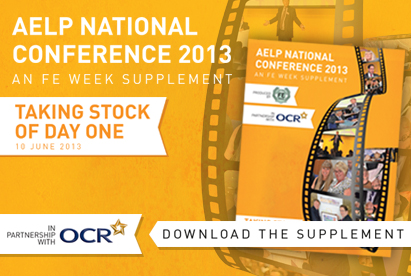We need to use technology in many different ways to improve apprenticeships says Matthew Hancock
Following the Association of Employment and Learning Providers’ annual conference I want to encourage some of our most important providers of apprenticeships and other work-related training to be open to the potential of new technology to transform their efforts to deliver knowledge and skills.
E-learning is more widely used in schools, colleges and universities than it was when the government took office. Many have already discovered how, in our digital age, it has the potential to communicate with young people especially through a medium with which they are already more comfortable than the traditional chalk-and-talk. They are seeing, too, how it can free more of educators’ own valuable time to deploy their expertise to maximum effect.
Simply put, e-learning is one of a growing range of educational strategies which institutions these days cannot afford to be unaware.
Already, three-quarters of businesses which train their staff make some use of electronic media in doing so. I want the FE and skills sector — public as well as private — to take the lead, to embrace innovation and make the most of new technology.
Understanding the different ways that diverse learners in FE can use technology and making sure that it is used in a way that improves the quality, breadth of their learning and the impact is paramount. The way in which online learning is now being used to assist the rehabilitation and reintegration of offenders, and all the challenges in terms especially of safeguarding that have had to be overcome in the process, are good examples of what I mean here.
The key will be harnessing knowledge and expertise to identify and make sense of a complex and fast-changing environment”
The culture change required to see technology harnessed more widely and more successfully is not easy. FE is innovative and responsive. Of course this needs leadership, but it also involves teachers and support staff, too — making sure they are supported, and if need be, challenged. The price is clear: better learning for students. And that, after all, is what FE is all about.
From the ways in which qualifications are funded and the rules around delivery are implemented, to the way qualifications are regulated, we must all ensure that barriers to innovation are confronted and broken down.
To understand which, if any, technologies to use is a real challenge that I’ve heard before from colleges and other providers The key will be harnessing knowledge and expertise to identify and make sense of a complex and fast-changing environment.
And we need to use technology to ensure that relevant information about apprenticeship training is readily available to such companies.
The launch of a new search tool on the National Apprenticeship Service website has been developed in response to a recommendation in last year’s Holt Report on making apprenticeships more accessible to small and medium-sized enterprises. It will enable employers of any size to access directly information about which training organisations support what apprenticeship frameworks and job roles in their area. This will make it much easier for employers to make an informed choice about which provider will best meet their needs and those of their apprentices.
Over the last century and a half, FE and skills providers have confronted innumerable challenges successfully. The challenge of seizing the opportunities offered by new technologies and of reacting to how it is changing their customer base is the latest but by no means the least significant.
Matthew Hancock, Skills Minister

